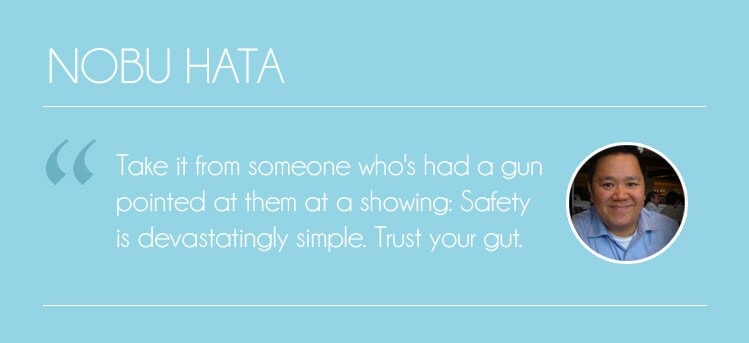Realtor Safety Guide
On a scale of one to ten (with ten representing absolute confidence), how would you rate your safety as a real estate agent?
Are you doing the most to keep yourself, colleagues, and clients safe?
Or are you conducting your business while leaving yourself open to risks that can be avoided?
Most people would believe that pursuing a career as a real estate agent would be relatively safe compared to a police officer or a construction worker. But the truth is that real estate agents are open to many dangers and risks that would shock their clients.
If you’re just starting as a real estate agent, you can’t afford to miss out on the safety advice that this article brings you. You need to know how to protect yourself, your peers, and your clients.
This is the stuff that wasn’t covered on the real estate licensing exam.
Advice from Real Estate Experts
To provide you with the best possible information on real estate safety we’ve asked real estate veterans for their opinion.
-
Nobu Hata
- https://twitter.com/nobuhata
- Website
-
Bill Gassett
- https://twitter.com/massrealty
- Max Real Estate Exposure
-
Kyle Hiscock
- https://twitter.com/kylehiscockre
- Rochester’s Blog
Safe Advertising

Advertising and marketing make the public aware of your existence as a real estate agent.
Mailers, postcards, flyers, emails, business cards, and social media posts are all different types of advertising you can utilize in the real estate industry.
But are you safely advertising your real estate expertise?
Here are a few pointers to make sure you’re keeping yourself and your business safe.
Dress Professionally
If you insist on posting a picture of yourself in any of your real estate advertisements, make sure that your attire is professional. Photographs in outfits that could be considered provocative (i.e. trying to capitalize on the idea that “sex sells”) can attract more trouble than clients. If you wouldn’t wear it to an interview, don’t wear it in an advertisement.
Don’t Advertise Personal Information
It’s dangerous to post personal information about yourself in a real estate advertisement. Never use your phone number, email, or home address when sending out advertisements. We live in an age where even the smallest amount of personal information can be used for criminal purposes.
No Listing Properties as “Vacant”
If you’re advertising a home for sale that is currently vacant, do not put that information on any of your advertisements. Squatters, burglars, and looters are always on the lookout for an opportunity to make money with little opposition. Publicly listing a property as vacant is a green light for them to make an easy profit.
Safety in the Office

You may believe that your real estate office is just a home base, but it’s also where your first line of defense begins. If you don’t practice safety in your own office, then the rest of your attempts at safety will fall apart.
If you want to keep you and your business safe, here’s what you’ll need to do.
Keep Personal Information Stored Away
Keeping personal information (finances, client contact info, etc.) out in plain sight on your desk is reckless and provides an easy opportunity for identity thieves posing as clients. Make sure important information is filed safely away in a locked desk/file cabinet and out of sight. Make sure you always keep the key in your possession (and don’t lock it in the desk!)
Keep Client Keys Locked Away
If you’re a seller’s agent and have copies of keys to your clients’ houses, make sure that they are kept in locked storage in the office. Keep them organized, labeled, and unattached to other sets of keys.
Invest in Anti-virus software
Whether you’re the head of a real estate brokerage or just starting, anti-virus software is an absolute must. Viruses can cripple your business if you’re not careful and don’t protect your clients. Remember that your personal information along with your clients is at stake if you’re computer were to get hacked.
Beware of Suspicious Emails
Hackers are persistent and are always trying to find new ways to steal information behind a guise of legitimacy. Do not open any suspicious emails, especially ones that request personal information. Even if it appears to come from a legitimate company, do NOT send non-public information via email.
Shred Documents that are no longer needed
Once you’re finished conducting business with your client, make sure that you shred any copies of their personal information before you dispose of it. Make sure that all of it is shredded thoroughly and taken care of in a secure manner. This also includes junk mail sent to you (such as credit card offers).
Ask Clients for Proof of Identity
It may seem impersonal, but it’s a good idea to ask potential clients for proof of identity (driver’s license, state ID, etc.) and to fill out an identification form. This way you can check their background and have some way to contact them and identify them. Identity thieves and other criminals posing as clients are hesitant to provide any personal information.
Introduce clients to another coworker
This may seem strange, but when meeting with a new client at the office, see if you can arrange for one of your coworkers to come in and introduce themselves. This gives you the advantage of someone else seeing the client’s face. Once again, criminals prefer meeting as few people as possible when trying to pull something. They’ll think twice if someone else sees their face.
Always tell a colleague where you’re going
If you’re going to attend a showing or are hosting an open house, make sure that someone at your office knows where you are. Tell them before you leave the office, let them know when you arrive, and call them just before you leave. Someone must know where you are in case you need assistance.
Establish an Office Safety Phrase
If you feel that you’re in danger (like at a showing) but you don’t want to cause a panic, it’s good to have an office safety phrase that seems meaningless to others when said in a phone conversation. For example, “Oh hi Jane, the showing at West St. is going great, but could you send me that email from Mr. Morgan?” This method of subtlety saves more people than you think.
Organize an Office Self-Defense Seminar
If you feel like it’s necessary, you could organize an office self-defense seminar for you and your coworkers (this also makes a great team-building exercise). Though it is recommended that you do not engage any assailants you encounter, having some basics of self-defense can be lifesaving in a bad situation.
Safety at Showings & Open Houses

Office safety is important, but so is safety when you’re in the field. As a real estate agent, you’re probably attending dozens of showings each week and hosting open houses. This is where all your safety prep in the office comes in handy.
But there are more safety tips you’ll need to know when you’re out & about. These will protect you and your clients from loss and harm.
No Night Showings
Home showings are best conducted during the day. This is so the home can be shown in its best light and that everyone can practice safety. If you’re attending a showing or hosting an open house, make sure that your business is done between dawn and dusk. This will keep you safe and minimize the probability of criminals.
Bring a Coworker/Friend
If you’re hosting a showing, see if you can convince a coworker or a professionally dressed friend to accompany you. There’s strength in numbers and having a second person there not only gives you an extra set of eyes but also deters thieves from making a move.
Don’t Carpool with Clients
This tip may seem like paranoia, but many real estate agents have experienced trouble from criminals who posed as clients just to get inside the agent’s car. Drive to a showing in your own or company vehicle and have your client arrange their transportation.
Park Wisely
Once you arrive at the showing/open house, make sure you park your car in a visible area that is close to the property. If possible, try and park under a streetlamp in case the showing runs long, and night sets in by the time you’re finished. Avoid parking lots, driveways, and other spots where your car (and you) can get blocked in.
Alert & Enlist the Neighbors
This is a good safety tip for hosting an open house: knock on the doors of the neighbors, introduce yourself, and tell them that you’re hosting an open house next door. That way, they’ll know what’s going on and may feel inclined to keep their eyes on the people coming and going.
Dress Professionally & Practically
When attending a showing/open house, make sure that you have the look of a professional real estate agent. Wear clothing that is professional but easy to move around in. Refrain from wearing flashy and expensive jewelry (or anything else you’d regret being robbed of).
Plan Your Routes
Once again, if you’re hosting an open house make sure you have the touring route planned out. You can take each guest on the same tour, and you’ll be able to work efficiently. Having a route planned before the open house will also allow you to plan out escape routes in case of an emergency.
Keep Your Phone on you & Charged
It’s a good habit for any real estate agent to keep their phone on their person and always charged. This is essential for lead capturing, emergencies, and situations that may occur during showings and/or at the office. Don’t set your phone down during an open house and charge it before you get there.
Guest Sign In
When hosting an open house, it’s good to have a sign-in sheet (or a notepad with a sign-in app) located near the door for guests to use. Ask guests to supply their name, phone number, and email so that they can be contacted easily. Once again, criminals will be hesitant to make a move on anything that requires them to sign anything (even if they plan on using a fake name).
Tell Clients to Hide Valuables
Far too many sellers’ agents forget to tell this safety tip to their clients: lock away your valuables if you’re hosting an open house. Cash, checkbooks, credit cards, mail, jewelry, priceless mementos, expensive electronics, and prescription drugs all need to be locked away or moved somewhere else during an open house. You don’t know who is moving through the home or what they have planned.
Guide from Behind
When touring the home with potential buyers, make sure that you follow rather than lead. Again, it sounds paranoid but it’s better to not have your back to people you don’t know. Avoid taking them fully into rooms with only one escape and or tight areas (such as attics).
Always Know Your Surroundings
From the moment you first arrive, to every guest you talk to, and even when you leave – you mustn’t let yourself become distracted. Always maintain situational awareness of what’s happening around you. Some crooks may try to distract you with talk of making an offer, while an accomplice tries to steal something.
From Real Estate Experts
Nobu Hata – Director of Member Engagement for the National Association of REALTORS®

Q: Best ways to show the property to new clients? (daytime vs night time)?
There isn’t a “best time” to show homes. There is no such thing as “new clients,” only prepared ones. The better agents prepare their clients the better the experience will be for everyone.
With sellers, have them set expectations for showings; depersonalize the home, take down personal pics, lock up mail, lock up prescriptions and jewelry, remove all identifiable info from the walls of the home office so people can’t Google them. Educate sellers on the showing process and remind them at every showing.
Give your business cards to sellers and inform them that if they get a stranger knocking on their door, they should give that person your card to inquire about the home. With buyers, agents must set expectations for them. Have an actual orientation and discuss how your business processes mesh with their thought process. Have deadlines for showing requests, like 12 to 24 hours before. Inform them on matters like sitting in front of an occupied home and requesting a last-minute showing – there are PEOPLE in that home that you’re freaking out.
Get a sign call? Ask three questions: Who are you? How did you find me? Do you mind proving who you are in some way for both our safety? Trust your gut – if you get weird answers, say no. If it gets really weird, do your colleagues a solid and alert your association.
Cyberscams have become an issue during the contract term, so inform your clients that they should be checking in with you with any emails or inquiries they get via email involving money. Discussing WHO your mortgage and title partners are is important, so your buyers and sellers don’t inadvertently wire cash to strangers.
During the orientation, Google your clients to see if they’re saying something stupid over their social media that can be used against them in a deal and convey the value of shutting up with the ones that are. Overall, don’t insulate your clients from reality; HGTV hasn’t told people the perils of buying and selling homes, so we should. After all, guiding people through the process is one of our core value propositions.
Q: How should you advertise yourself online?
Once you disclose what your department of commerce says you should disclose on your advertising and marketing (yes, social media counts as marketing), I would remove personal info from anything pointed to the public: Use a Google Voice number instead of personal cell phone numbers. Use general email addresses like “[email protected]” or even generate an email address for a home – “[email protected]” that you could point to marketing AND your clients – to depersonalize marketing, narrow down the source of any cyber scam leaks, and to create a focal point for client interaction. On social media, in particular, know that – whether you like it or not – you are a public figure and a target, so imagine yourself running for Congress someday. Watch what you say, especially when it involves your clients. Be a responsible adult in HOW you say things. When in doubt, shut up. Every bit as social are review websites like portals, yelp, LinkedIn, and Google, so integrate them into your marketing and business processes. Did you do good work? It should speak for itself through your happy clients.
Further, most of your pre-client contact marketing should be informative, covering all of the above. You should have a “25 steps to buy/sell a home” plus a “glossary of real estate terms” that inform your soon-to-be clients of the realities of selling and buying a home, your value proposition in light of online real estate, and more. What Google searches aren’t telling people is marketing now, especially in real estate. Embrace it.
Q: Any crazy realtor stories?
Take it from someone who’s had a gun pointed at them at a showing: Safety is devastatingly simple. Trust your gut. Think with your brains instead of your wallet. Be inquisitive with cold calls and go three questions deep with strangers. Have a buddy system. Setting expectations early, even for people you haven’t even met, will make your life easier. Learn to say no, especially when things get weird. Want more info? Go here: realtor.org/safety.
Bill Gassett – real estate agent in Franklin, MA

Guys thanks for allowing me the time to share my expertise with your audience. Today more than ever a real estate agent needs to be careful when showing homes to prospective buyers. The dangers out there are very real. Some people will specifically prey on real estate agents because of the vulnerability in which we are placed when showing homes, especially when located in remote areas. It is imperative to take smart precautions when showing homes. One of my recommendations is to always show during daylight hours. If you are going into an unfamiliar area you should always let someone close to you know exactly where you are going and when you expect to be done.
Some who don’t want to take any chances will have another agent come along with them. Having a buddy system in place with another agent in your company who agrees to accompany each other’s showings in times of uncertainty is just plain smart.
It is always difficult to hear about the unfortunate tragedies that have struck a few unlucky individuals in our industry. It certainly makes for a heightened awareness of our surroundings and who we put in our cars or meet at a property. This does not mean, however, that as agents we have to abandon our efforts to be publicly visible. There are very few “secret agents” who can make it in this business. I am not one who would recommend restricting contact information in places such as your website, social media, or printed marketing material. Be vigilant, but don’t give up the necessities of the business that make us who we are as agents.
One of the best pieces of advice I can give agents is to schedule all clients to meet in your office first if you don’t know them. Besides the fact this is important from a safety perspective it is also more professional. It is the perfect opportunity to sit with a potential client and learn their needs in detail. It also allows you to explain how you work as an agent.
For example, many people do not know that most real estate agents work on commission. A great agent will explain how the business works at their first opportunity. Do you want to be out showing homes with a buyer for weeks and then find out they stumbled into an open house and bought it without you? Of course not, so explain how our business works upfront. Don’t assume anything. Most of all are safe!
Kyle Hiscock – real estate agent in Rochester, NY

Safety First
Practicing safety as a real estate agent is essential for a long and successful career in the field.
Getting into these kinds of habits early in your career and making them part of your daily routine will only benefit you in the present and the future.
Remember, making these safety tips part of your job as a real estate agent isn’t just about protecting yourself. These tips also protect your business, your colleagues, and your clients.




